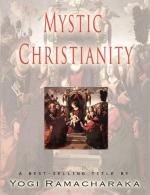But instead of the expected customary words and illustrations—technical theological hair-splitting and dreary platitudes—He began to preach in a manner unknown to the Nazarenes. His opening sentence broke the silence and greatly startled and disturbed the congregation. “This day is this Scripture fulfilled in your ears,” were his opening words. And then He began a statement of His conception of His ministry and His Message. Thrusting aside all precedent and musty authority, He boldly proclaimed that He had come to establish a new conception of the Truth—a conception that would overturn the priestly policy of formalism and lack of spirituality—a conception that would ignore forms and ceremonies, and cleave close to the spirit of the Sacred Teachings. And then He began a scathing denunciation of the lack of spiritual advancement among the Jewish people—their materialism and desire for physical enjoyments and their drifting away from the highest ideals of the race. He preached the mystic doctrine, and insisted that they be applied to the problems of every-day life and conduct. He brought down the teachings of the Kaballah from the cloudy heights, and set them before the people in plain, practical form. He bade them aspire to great spiritual heights, forsaking the base ideals to which they had clung. He ran counter to every custom and prejudice of the people before Him, and showed a lack of reverence for all of their petty forms and traditions. He bade them leave the illusions of material life and follow the Light of the Spirit wherever it might lead them. These and many other things told He them.
And then arose a disturbance among the congregation. They began to interrupt and question Him, and many were the contradictions and denials hurled at Him from the benches. Some began to sneer at His pretensions as the Bearer of the Message, and demanded that He work a wonder or “miracle” and give them a sign. This demand He flatly refused to grant, not deeming the same proper, or in accordance with the occult custom which always frowned upon wonder-working in response to such a demand. Then they began to abuse Him and cries of “charlatan” and “fraud” began to resound from the walls of the synagogue. They reminded Him of His humble birth and condition of His parents, and refused to believe that any such person as He had any right to claim extraordinary powers or privileges. Then came from His lips the famous saying, “A prophet is not without honor, save in his own country.”




